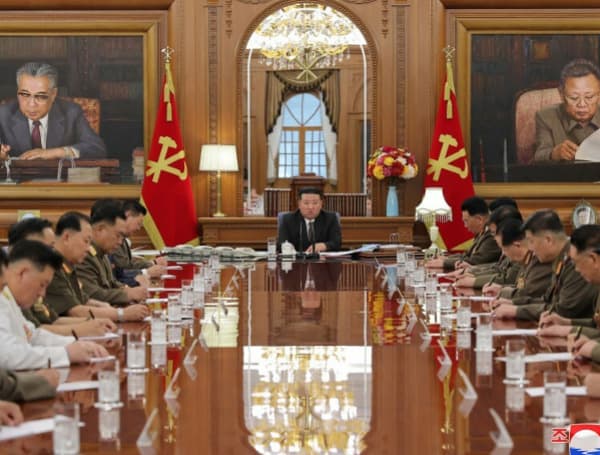North Korean leader Kim Jong Un pledged to implement the “toughest” anti-U.S. strategy during a ruling Workers’ Party meeting, state media reported Sunday, as tensions with Washington rise ahead of Donald Trump’s second term as U.S. president.
Kim’s remarks, delivered at the conclusion of a five-day party plenary, underscore Pyongyang’s growing defiance amid increased military cooperation with Russia and deepening hostilities with the U.S., South Korea, and Japan.
READ: North Korea Plans To Deploy More Troops And Weapons To Russia As Casualties Mount
Kim characterized the United States as “the most reactionary state” and accused Washington of expanding its security alliance with South Korea and Japan into “a nuclear military bloc for aggression.” He stressed the need for North Korea to advance its defense capabilities and called for enhancing the mental toughness of its military personnel.
“This reality clearly shows to which direction we should advance and what we should do and how,” Kim said, according to the Korean Central News Agency (KCNA). The agency noted that Kim laid out plans for “aggressive” anti-U.S. counteractions aimed at protecting North Korea’s long-term national interests and security, though specific details were not disclosed.
Trump’s return to the White House raises questions about the future of U.S.-North Korea diplomacy. During his first term, Trump met Kim three times in an effort to address Pyongyang’s nuclear ambitions. Despite a temporary thaw in relations and Trump’s claim that he and Kim “fell in love,” talks ultimately collapsed in 2019 over disagreements on U.S.-led sanctions.
READ: Zelenskyy: Over 3,000 North Korean Soldiers Killed Or Wounded Fighting For Russia In Kursk
Since then, North Korea has ramped up its missile testing program, aiming to build more reliable nuclear weapons capable of striking the U.S. and its allies. The U.S., in turn, has intensified military drills with South Korea and Japan, prompting North Korea to denounce the exercises as rehearsals for invasion.
Trump’s immediate focus on other global crises, including the conflicts in Ukraine and the Middle East, is likely to delay any high-profile diplomacy with Kim. Moreover, North Korea’s growing support for Russia’s war in Ukraine adds a new layer of complexity to U.S.-North Korea relations.

According to U.S., Ukrainian, and South Korean assessments, North Korea has sent more than 10,000 troops and conventional weapons to support Russia’s war effort. Ukrainian President Volodymyr Zelenskyy recently claimed that 3,000 North Korean soldiers have been killed or wounded in Russia’s Kursk region since their deployment began in October.
In return, experts fear Russia may provide North Korea with advanced weapons technology, potentially accelerating Pyongyang’s nuclear missile development. Such cooperation has heightened concerns in Washington and among its allies about the growing axis between North Korea, Russia, and China.
READ: U.S. Treasury Targets North Korean Money Laundering Network Involving Digital Assets
China and Russia, both embroiled in disputes with the U.S., have repeatedly blocked American-led attempts to impose additional U.N. sanctions on North Korea in response to its missile tests. This diplomatic shield has allowed Pyongyang to continue its weapons programs with relative impunity.
Last month, Kim declared that past negotiations with the U.S. had only confirmed Washington’s “unchangeable hostility” toward North Korea. He reiterated his belief that strengthening the country’s nuclear arsenal is the only viable means of countering external threats.
As Trump prepares to take office, the prospects for renewed dialogue with North Korea remain uncertain. Experts caution that Pyongyang’s alliance with Moscow, its missile advancements, and heightened anti-U.S. rhetoric will pose significant challenges for any future negotiations.
Kim’s latest declarations signal a hardening stance, raising the stakes for the incoming U.S. administration and its approach to managing the North Korean threat in an increasingly volatile geopolitical landscape.
Please make a small donation to the Tampa Free Press to help sustain independent journalism. Your contribution enables us to continue delivering high-quality, local, and national news coverage.
Connect with us: Follow the Tampa Free Press on Facebook and Twitter for breaking news and updates.
Sign up: Subscribe to our free newsletter for a curated selection of top stories delivered straight to your inbox.

